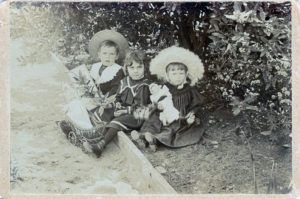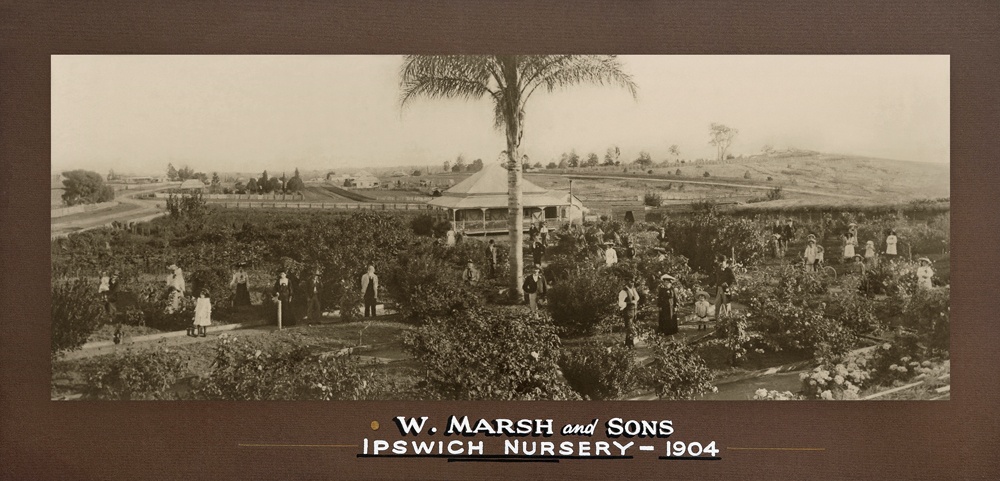The Ipswich Nursery located at the corner of Thorn and Short Streets opened for business in 1891. William Marsh and his brother were proprietors who resided on the property. The nursery was established on 2 allotments (about ¾ acre or 3035 square meters) with a large nursery building. That first year of operation the brothers cultivated begonias, Cyprus pines, coffee trees, staghorns, loquat trees, azaleas, dahlias and more.
By 1903, the Ipswich Nursery had 3 and a half acres under cultivation having purchased adjacent properties on 3 separate occasions over the intervening years. The firm’s reputation was now extensive and orders came from as far afield as Tasmania. In 1908 three more acres were acquired for growing tomatoes, and a showroom added to the nursery buildings where pot plants and staghorns were housed. By the end of that year it was announced that Walter Darker, who already had an established stationery business in Brisbane Street, was adding a floristry department to his shop and that fresh flowers from Ipswich Nursery would also be available there. This joint venture between Darker and Marsh was named City Florists. They supplied wreaths, bouquets and other floral arrangements. Marsh & Co. raised fruit trees and grew fruit so successfully that local fruiterers sold some of the produce and some supplied country areas. They also contributed large numbers of trees for Arbor Day celebrations, and in 1904 when Ipswich was proclaimed a city they supplied 100 trees for street plantings to mark the occasion.
The company advertised regularly in the Queensland Times newspaper during these years and their recordings of rainfall were often reported in that paper from around 1910 to the 1920s.
By 1918 the company was known as W. Marsh and Son after William’s son Robert G. Marsh joined the business. Later his son-in-law E.W. Neale, who lived in Quarry Street, would be admitted as a partner with the name then changing to W. Marsh and Sons. In 1918 they opened a new florist shop in Brisbane Street a few doors from Mr Darker’s establishment. Apparently Darker surrendered the floral business due to the constant pressure of expansion and his inability to devote more attention to it.
William Marsh contracted the deadly Spanish flu in 1919 but survived the pandemic that killed so many around the world. This scourge however was responsible for the deaths of 41 people in the Ipswich district between May and June of 1919. William later died in February 1934 at the age of 75 years still at his residence at the Ipswich Nursery. His parents had been pioneer farmers of the Raceview area. Young William worked on the farm and in their orchard and was later employed by Joseph Foote as a gardener. He also designed the gardens at Brynhyfryd for Lewis Thomas.

Children of William and Martha Marsh, owners of Marsh’s Nursery, Ipswich, ca. 1905 (Image courtesy of Picture Ipswich)
W.Marsh & Son were a part of the Ipswich landscape for many more years and in 1961 were still advertising their floristry business at 105 Brisbane Street.
Information taken from:
Buchanan, Robyn. Ipswich in the 20th century, Ipswich: Ipswich City Council, 2004. p.53.
Queensland Times, Ipswich Herald & General Advertiser, 1 October 1891, p.4.
Queensland Times, Ipswich Herald & General Advertiser, 27 June 1903, p.4.
Queensland Times, Ipswich Herald & General Advertiser, 22 December 1908, p.6.
Queensland Times, Ipswich Herald & General Advertiser, 23 May 1908, p.4.
Queensland Times, Ipswich Herald & General Advertiser, 10 December 1908, p.4.
Queensland Times, 23 December 1909, p.7.
Queensland Times, 31 October 1910, Advertising section on p.1.
Queensland Times, 11 May 1905, p.10.
Queensland Times, 10 June 1919, p.5.
Queensland Times, 1 June 1918, p.6.
Queensland Times, 26 February 1934, p.8.
Your home Universal Business and tourist guide for Ipswich [and] Boonah, 1961, p.25.


